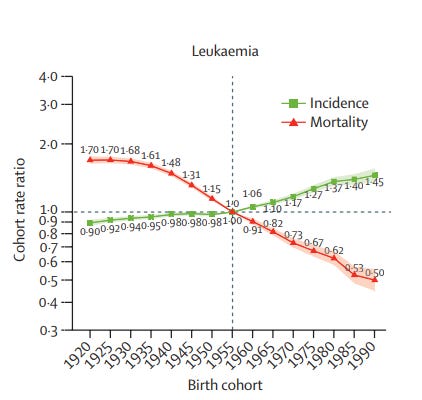Death from cancer at any age is tragic, but the death of younger people tugs even harder at our heartstrings. The Lancet Public Health published a large study of cancer registry records from over 23 million in the US and showed that the risk of cancer diagnosis increased in about half of the types of cancers they studied. For instance, the risk that someone born in 1990 would get pancreatic or kidney cancer is twice as large as those in the cohort born in 1955. The increase is especially prominent in cancers associated with obesity, including colorectal, uterine, biliary, kidney and pancreatic cancers.
The reasons for the increase in cancer in younger people are not clear. Current imaging and testing allow us to diagnose some cancers that would have gone undiagnosed in those born in the early 1900s, and it’s possible that increased environmental toxins such as PFAS (forever chemicals) or microplastics or changes in intestinal bacteria (gut microbiome) might play a role.
The study showed that even for some cancers where the likelihood of getting cancer is higher, mortality has declined as our treatments have improved. For instance, you can see below that the rate of leukemia has gone up by birth cohort, but the likelihood of dying has declined.
Source: Sung, et al Lancet Public Health, August, 2024 LINK
Overall, death from cancer in the US continues to decline. Here is data published earlier this month in JAMA:
Source: Ahmad, et al JAMA August 8, 2024 LINK
Also, the likelihood of being diagnosed or dying of cancer is very low at younger ages, so even a large percentage increase in diagnosis will still mean a relatively small number of additional cases. Here is data from the American Cancer Society:
Source: Siegel, et al CA- A Cancer Journal for Clinicians, January, 2024 LINK
Implications for employers:
- While we are concerned that some cancers are increasing in younger adults, there is still the opportunity to save many lives by improving screening rates for breast, colon, cervical and lung cancer in recommended age groups.
- Some cancers, including cervical, throat, and liver, can be prevented by vaccinations.
- Researchers continue to look for screening tests that are appropriate to use in younger people. However, screening those below the age recommendations could in some instances cause more complications.
- Employers can look to the US Preventive Services Task Force for evidence-based recommendations for screening, and to their carriers for technology assessments of new screening modalities.
- Even those who are young should seek medical attention promptly if they have worrisome symptoms.
Thanks for reading. You can find previous posts in the Employer Coverage archive
Please subscribe, “like” and suggest this newsletter to friends and colleagues. Thanks!
Tomorrow: Thursday shorts and followups, including CMS drug price negotiations, trauma fees, shingles vaccine and dementia, COVID vaccines, and MDMA





